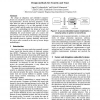Free Online Productivity Tools
i2Speak
i2Symbol
i2OCR
iTex2Img
iWeb2Print
iWeb2Shot
i2Type
iPdf2Split
iPdf2Merge
i2Bopomofo
i2Arabic
i2Style
i2Image
i2PDF
iLatex2Rtf
Sci2ools
DATE
2007
IEEE
2007
IEEE
Design methods for security and trust
The design of ubiquitous and embedded computers focuses on cost factors such as area, power-consumption, and performance. Security and trust properties, on the other hand, are often an afterthought. Yet the purpose of ubiquitous electronics is to act and negotiate on their owner’s behalf, and this makes trust a first-order concern. We outline a methodology for the design of secure and trusted electronic embedded systems, which builds on identifying the secure-sensitive part of a system (the root-of-trust) and iteratively partitioning and protecting t-of-trust over all levels of design abstraction. This includes protocols, software, hardware, and circuits. We review active research in the area of secure design methodologies.
Related Content
| Added | 02 Jun 2010 |
| Updated | 02 Jun 2010 |
| Type | Conference |
| Year | 2007 |
| Where | DATE |
| Authors | Ingrid Verbauwhede, Patrick Schaumont |
Comments (0)

